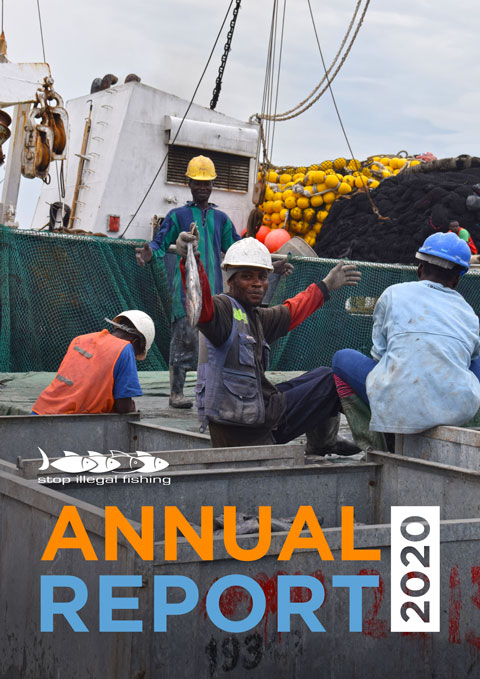Stop Illegal Fishing Annual Report 2020
2020 has been dominated by COVID-19, its impact on fisheries, monitoring, control, and surveillance (MCS) and on our work. We have had to rethink our working lives, and learn new ways of doing things. While we have all missed the opportunity for face-to-face meetings and all the benefits these bring, moving to virtual platforms for training, mentoring, discussions, decision making and sharing of information has led to the discovery of new and beneficial ways of working.
Our biggest success in 2020 has been the development of the use of body worn cameras for fisheries enforcement. The approach was developed as a substitute for in person mentoring of port inspections under SIF’s Port State Measures to Stop Illegal Fishing (PSM-SIF) project. The pilot scheme involved the use of cameras in Ghana and Mozambique, enabling us to not only provide on going support to inspectors but, without the travel needed to different ports and countries, to increase the frequency and regularity of the support.
The further application of the body worn camera support has received considerable interest with potential applications identified through the supply chain from catching and transhipment to offloading. The increased opportunity to provide expert or multi-agency agency support to fisheries inspections has the potential to be a real game changer. The benefits of improved interagency cooperation, increased professionalism, reduced opportunities for corruption and intimidation and the securing of information as evidence are significant.
Much of our work this year has focussed on the importance of port State measures. This has been through the PSM-SIF support in Ghana, Madagascar, and Mozambique, and also through SIFs support to the West Africa Task Force where the WATF members have identified port controls as the main area for support.
Our flagship publication for 2020 was ‘Moving Tuna’ which took a deep dive into transhipment in the Western Indian Ocean. The key findings highlighted the significance of the comprehensive application of port controls to all fishing and transport vessels using ports, not only those unloading fish, the validation of transhipment monitoring with other MCS information and the need to attract more benefits from regional transhipment for the countries of the region.
While global attention is focussed on developing ocean economies, we must take the opportunity to embed sustainability as a core principle of blue growth. The pressure to increase national revenues from the licensing or registration of fishing vessels must be considered alongside State responsibilities to monitor and control these vessels, and the very real risks associated with fleets, vessels and operators that have a track record of non-compliance.
Sustainable development goal 14 (SDG 14) concerning life below water is a priority focus for Africa where so many of our communities are reliant on fish, inland waters and oceans to provide food, employment and income. To counter the new challenges faced by fisheries officers working on the frontline, we must work harder and smarter to identify and act against illegal fishing.
Elsa Patria, Chairperson
